- Home
- David Lubar
Pulling up Stakes and Other Piercing Stories Page 2
Pulling up Stakes and Other Piercing Stories Read online
Page 2
"Estes Park." He smiled. "That was a lifetime ago."
"Did you know Mrs. Kensington back then?" I asked.
The smile moved closer to a grin. "Yup. Should have seen the look on her father's face when she brought me home. Thought he was going to pull out a shotgun and chase me off." He laughed and shook his head. "As my wife likes to say, I clean up well."
I glanced over my shoulder, past Lindon and Suzie, at Delia, who was actively chatting with Candace. I watched her for a while, but she never looked my way.
The traffic grew heavier and then slowed to a crawl when we got near the Dome. We finally reached the parking lot.
"I'll see you kids back here," Mr. Kensington said. "Have fun. I'm going to watch the Phillies and drown my sorrows in club soda." He headed off toward the Hilton.
Delia came over and took my hand. "This is going to be so great."
People stared at us as we made our way to the entrance. I normally didn't pay any attention to that, since it was an everyday thing. But I noticed that Delia scanned the crowd, watching them watch us. Some of them probably didn't see me at all. Delia was quite stunning. But others had that question in their eyes. What's she doing with him?
We got to our seats and my stretch of purgatory began. A bad concert is a great place to lose yourself in thought. While Delia and her friends bopped along and screamed and enjoyed the music, I thought about the two of us. It was hard at first to extract actual details. Delia's presence, even in memories, was like a thousand-watt bulb. But I squinted past the gleam and found a string of moments we'd spent together. Fragments. Our first date. We'd been drawn in different directions at the museum. I could have spent all day with the abstracts and surrealists. Delia preferred impressionists.
And after the museum? We went to the movies a couple times, but not to any films I wanted to see. We went to the mall. Delia liked to shop. I didn't. We grabbed a burger or went for coffee, but we didn't talk a whole lot. When we hung out in her room, she'd surf and I'd read.
I was pulled from my thoughts by Delia's words. "It's over," she said.
"What?"
"The concert's over."
"Right."
"You're pretty quiet tonight," she said as we walked back to the parking lot.
I nodded. Hard to know how to respond to that sort of statement. Fortunately, I didn't have to dredge up a reply. All of them started reliving the evening, discussing every song.
"Want me to take the front?" Arthur asked when we reached the van. I guess he figured if he was nice to me I wouldn't stab him.
"That's okay. I don't mind." I climbed into the seat, closed the door, and leaned against the window. Behind me, they kept talking.
Delia was having a sleepover, so Mr. Kensington dropped her and the girls off first, then took Lindon and Arthur home. I didn't pay any attention to them. I was still wandering through the memories.
"When are you going to do it?" Mr. Kensington asked as he pulled away from Arthur's house.
That jolted me out of my thoughts. "Do what?" Good god, was he asking me if I was going to sleep with his daughter? I wondered whether I should jump from the van before he turned back into a crazed biker and stomped me to death.
"Break up with her," he said.
I let my heart climb back into my rib cage. "How'd you know?" I'd barely accepted it myself.
He shrugged. "Some things are easy to see from a distance. Especially when you've seen them before. Usually, she dumps the guy. Once in a while, it's the other way."
No point lying to him. Or to myself. "You think she'll take it okay?"
He nodded. "Things might get a bit dramatic. And my credit card will take a hit when she shops her way through the pain. But sure, she'll be fine. There's only one thing that worries me."
"What's that?"
"I wonder who she'll bring home next."
There was a moment of silence as I let my imagination play with that question. I figured Mr. Kensington had already dreamed up his own list.
"Why do you think she does it?" I asked.
"Why do you poke holes in your face," he asked me back.
I wasn't sure whether he expected an answer. I wanted to give him one, but I really didn't think I could sum up my life in a sentence or two. Finally, I just said, "That's not the same thing."
He nodded. "Yeah. You're right. It isn't. You're only hurting yourself."
I watched the street lights pass by outside the window for a couple blocks. Before, at the concert, the breakup was just an idea. It existed in the realm of should I? But now that I'd spoken about it, I knew it was real. It's over. I thought about losing Delia. Pictured my existence without her. There was a void, but it wasn't a painful wound. I'd be fine, too. It was like if I took out one of my piercings. Eventually, the hole would close up. There might be a small scar, but the that was all.
And it wasn't as if I hadn't enjoyed being with her. Whatever her reasons for going out with me, whoever she was trying to shock, we'd had some fun. Maybe, to be honest, I enjoyed the reactions as much as she did. But it was time to move on.
Still, there was something else I didn't want to walk away from. "That lake where you caught the smallmouth...?"
"Manalappa Reservoir," he said. "I belong to a rod and gun club there. It's just an hour north."
"Uh huh." I felt like a kid at his first dance, tiptoeing around the chance of rejection. "You got any hard feelings against any of her ex guys?"
"Not as long as they treated her right."
I dangled a hint. "Any of them fish?"
"As far as I know, until now, none of them knew a bass from a hole in the ground," he said. "Not that we ever talked much."
"Oh."
We were both quiet for a moment. I realized it had been a stupid idea, anyhow.
"You want to go fishing some time?" he asked.
Or maybe not so stupid. "Yeah. I'd like that."
"Me, too."
Then a shadow crossed my mind, cast by an image of the two of us strolling up to the bank, him in khaki with an Eddie Bauer vest, me in black with Ace Hardware chains. "Are you just trying to shock people?" I asked.
We'd reached my place by then. After he pulled to the curb, he turned toward me, a grin on his face. "I hadn't thought of that. But you have to admit, it'll be fun to watch their expressions. Got a lot of good old boys living up that way."
"That could be interesting." I guess he still had a bit of the rebel biker in him. And I guess maybe some of Delia's habits were genetic.
"I'd been thinking of heading out there tomorrow. Join me?"
Did I want to go fishing with my soon-to-be-ex-girlfriend's dad? Life didn't get much weirder than that. "Definitely."
"Pick you up at six?" he asked, holding his hand out, fingers spread, palm facing me.
"Wouldn't miss it," I said, giving him a hand slap. I thanked him for the ride and headed up the walkway, half lost in the past, thinking about the last time I'd felt the tug of a fish on the line.
Then my thoughts shifted to the future. My grin matched his as I imagined what would happen when I told my friends. Maybe even showed them a snapshot of me, Mr. Kensington, and a small mouth bass. Man, they'd be in for a shock.
War Is Swell
As the second burst of machine gun fire tore the air with its deadly rhythm, Jorgi clutched his stomach and fell to the floor, curling his body into a tight ball around the pain that exploded through his gut.
He called to his little sister, who was sprawled on her back just beyond his reach, "Katya?"
"It hurts," she said, her words half smothered by the rumble of an exploding mortar shell.
"We didn't know," he said. A shower of plaster fell from the ceiling. Jorgi closed his eyes and fought against the panic that came whenever the earth shook, but this tremor was brief and the building was sturdy.
"We were pigs," Katya said.
"Yes, pigs," Jorgi agreed. "I never guessed it could hurt so much." He rose to his knees, then gave
up and dropped back to the floor. It was too soon to try to stand. Despite the pain, he had to smile. He'd known hunger all his life. It was a familiar pain, made worse these past few weeks when nobody had food to spare. Who would have thought there was far worse pain in eating too much?
"Let's not be pigs next time," Katya said.
"Just be happy we're here," Jorgi said. He couldn't believe their luck. They'd been alone on the street right before sunrise when Abnar the baker fled. Abnar, who had never willingly given either of them so much as a small crust, left the village with his cart, his horse, and his family. He'd also left one important thing behind — an unlocked door. Inside, they found a treasure of bread, cookies, and two wedding cakes.
Ten minutes after they'd entered the bakery, Jorgi thought he'd never need to eat again. The crumbs of his victims littered the floor. A trail of ants had already joined the feast, streaming out from a large gap where the floorboards met the wall. As he watched them swarm over a piece of fallen cake, Jorgi wondered whether ants ever got stomach aches.
Katya stood and walked to the table that held the pair of wedding cakes. With a grunt, she tried to move the smaller one, but even that was too heavy for her.
"What are you doing?" Jorgi asked.
"I want to make them pretty again," she said.
"Let me help." Jorgi forced himself to his feet. He turned the cakes so the ruined parts faced the wall. "There. Just the way we found them." He didn't feel guilty about scooping handfuls from both cakes. The brides had left three days ago, with the growing stream of people who'd headed for the western border since the fighting reached the village. The grooms had joined the fighting. The cakes were already growing dry, the icing stiff. There would be no weddings.
For months, Jorgi had sensed rising tension in the voices of the old men who sat all day outside the cafe. They drank glasses of hot tea, passed around tattered newspapers, and talked in angry bursts about who was to blame for all the trouble. They'd seemed so concerned with the battle reports that none of them even bothered to chase Jorgi off with stones and curses the way they usually did.
The bakery shook as another mortar shell turned the empty stable across the street into a pile of splinters. A mountain of hay drifted down, lagging behind the rest of the debris as if it was eager to play in the spring breeze. Early morning rays of sunlight danced among the pieces.
"It's raining gold," Katya said, staring out the window.
"Let's go," Jorgi said. He filled a box with bread, picking the freshest loaves he could find.
Katya grabbed another box, which she loaded with cookies. "Back home?" she asked.
"No." Jorgi shook his head. Their home, an abandoned truck at the end of an alley three blocks away, was too close to the path of the mortars. They needed to find a new place. Jorgi liked the river. At night, the peaceful murmur of the water was better than any music. But some of the older men lived there — the ones who were too poor to spend their days at the cafe. Those men shouted at him and stole his food — food he had worked so hard to find for himself and Katya. No, not the river. They could go to the hills. Jorgi knew which plants were safe to eat. But they'd have to be careful to avoid the soldiers, who swarmed the hills like ants. Like ants on a cake...
"I know," Jorgi said, amazed that such a perfect idea had taken so long to come to him. "Abnar's house."
"Yes," Katya said. Her leap of excitement caused several small cookies to bounce from the box. "A bed," she said. "I'll bet there's a bed to sleep on. And maybe even a pillow."
"We'll see," Jorgi said. He didn't want her to hope for too much. Katya was such a dreamer. To her, the old truck where they usually slept was a castle one day and a sailing ship the next. Flat stones turned into plates and saucers when she served feasts to her make believe friends. At least the baker's house, at the top of a small hill to the east, was far from the center of the village, out of mortar range for the moment. Most of the shelling appeared to be aimed at the small cluster of government buildings that lined the main road near the larger shops — though, from what Jorgi had seen, nobody seemed to be able to aim anything very well.
"Listen," Katya said as they left the bakery and climbed over the splintered boards that had once been a stable wall. "No more bombs."
"They haven't stopped," Jorgi said. "I'll bet there'll be another one before I can count to ten." He started counting, quickly at first, but then stretching out each number longer than the one before. When he reached nine, he used every bit of air in his lungs to keep the sound alive. Finally, he gave up, took a deep breath, and said, "Ten."
Far behind them, a blast blew another hole in the street. Jorgi gritted his teeth as a jolt passed through the ground. To his left, near the butcher's shop, a young tree trembled, its leaves shivering in the sudden wind. A moment later, cobblestones rained down in the distance with the sound of galloping horses.
"Let me try," Katya said. "I know my numbers." She started counting. A mortar shell fell when she reached seven. As she hunched over against the shock wave, she spat out the rest, "eightnineten. I did it!"
"You sure did," Jorgi said, smiling at his sister. He stepped around a broken bicycle that had been abandoned in the road. "You're very clever, Katya." It was true. He remembered the time he'd had the fever. Katya had taken care of him for three days, cooling his head with water from the river and grinding food into a paste he could swallow past his swollen throat. She was more than just clever — she was brave.
"Go on. It's your turn," she said as they left the main road for the narrower path that led up the hill.
Jorgi reached ten without an explosion.
"My turn," Katya said. A mortar shell blew up far to their left while she counted. "That's two for me."
They played the game all the way to the baker's house, which sat in the center of a large yard, surrounded by a whitewashed wall. The gate was open.
"Wait here," Jorgi said after they walked down the brick pathway and stepped inside the front entrance. He needed to make sure everything was safe. As he dashed from room to room, he saw no sign of damage. No ceilings ready to crumble, no walls ready to topple like that dreadful moment — the day when the earth shook and the walls crushed his world, burying their parents, leaving him and Katya alone.
The memory of the earthquake was barely more than a dream now. How long? Three years? Four? What was the difference? Somehow, they'd survived, day by day. Always hungry, always cold in the winter, hot in the summer. But alive. They'd found their way to this village, but never found a home, never found people who could afford to offer them more than a brief moment of kindness or a scrap of food.
"There's not one bed," Jorgi told Katya when he returned to her.
"No?" she asked, her face growing dark with disappointment.
"No. Not one. There are five!" he shouted, lifting his sister by her waist and spinning around.
"Can I pick first?" she asked when he put her down.
"Of course."
The mortars stopped for a while, as did most of the gun fire. They slept well that night, and ate well again in the morning.
In the afternoon, they sat on the warm red tile roof of the house, a terrifying and exhilarating three stories above the ground, and watched as a group of men dug holes in the north road and planted land mines. They made a game of guessing where the men would dig next — left, right, or center. Katya was good at the game, which made Jorgi proud. "You're very smart, little sister" he told her.
The next morning, they discovered that the butcher had also fled, leaving behind unbelievable riches. Jorgi cooked thick lamb steaks in the baker's kitchen, frying them in a pan with onions he'd found in the cellar. A sweet, satisfying aroma filled the air as the meat sizzled. They'd made three trips to the butcher's, bringing home sausages, too. The hard, dried ones with the wonderfully spicy flavor — the kind that would keep well in the coming heat of summer.
"Real plates," Katya said as she set the table. She rubbed her hand carefully acr
oss the blue flowers painted on the gleaming white china, then refolded the linen napkins until they were perfectly arranged.
They ate with heavy knives and forks of silver and drank their water from crystal goblets. Katya, giggling, shouted orders to the servants. Jorgi played along, unwilling to do anything that might break the spell for her.
That evening, they watched a different group of men dig up the mines. Jorgi kept count, and gave Katya a cookie for every fifth mine. It wasn't as much fun as the guessing game, but he still enjoyed the look on her face each time he got close to the magic number.
After sunset the airplanes came.
"It's beautiful," Katya said, holding her brother's hand as they stood on the balcony of the large bedroom, watching the dazzling flashes that bloomed like giant sunflowers wherever bombs struck the ground. She pointed at the brilliant streaks of light that danced from the earth toward the heavens.
"Those are called tracers," Jorgi explained. He loved to show her the things he'd learned from listening to the men. "They let the gunners know where their bullets are going, so they can shoot the planes."
"Who's flying the planes?" Katya asked.
Jorgi shrugged. "I'm not sure." He knew that the soldiers attacking the village were enemies. The planes seemed to be bombing the enemy soldiers, so the planes must be friends. But sometimes the bombs hit the village, too. So maybe they weren't friends. Or at least not good friends. Right now, it really didn't matter, as long as none of the bombs hit the baker's house.
A plane exploded, turning the sky from deep black to red for a blinding instant. A lazy boom reached their ears several seconds later. "We used to have a festival," Jorgi said. Another faint memory. "This is like —" He stopped to find the word. "Fireworks!"
"I wish I could go to a festival," Katya said.
"You will, someday," Jorgi told her. "I promise. Not now. But when the war is over."
Katya gasped. "When the war is over?" Her hand opened and slipped limply from Jorgi's grasp.
"Yes, when the war is over." It was a phrase he'd heard many times from the lips of nearly everyone in the village. When the war is over... It was always followed by a plan or a dream or a hope. He watched as his sister turned and stared across the room at the plump feather bed with three pillows, each as soft as a baby rabbit.

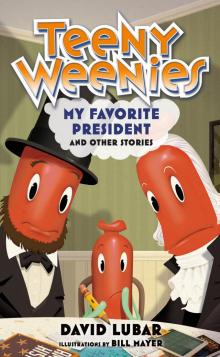 Teeny Weenies: My Favorite President
Teeny Weenies: My Favorite President Teeny Weenies: The Intergalactic Petting Zoo
Teeny Weenies: The Intergalactic Petting Zoo Teeny Weenies: The Eighth Octopus
Teeny Weenies: The Eighth Octopus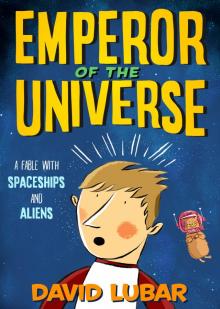 Emperor of the Universe
Emperor of the Universe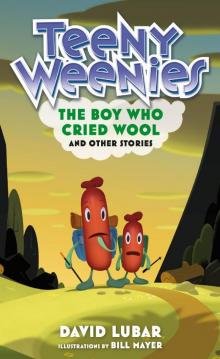 Teeny Weenies: The Boy Who Cried Wool
Teeny Weenies: The Boy Who Cried Wool Teeny Weenies: Fishing for Pets
Teeny Weenies: Fishing for Pets Teeny Weenies: Freestyle Frenzy
Teeny Weenies: Freestyle Frenzy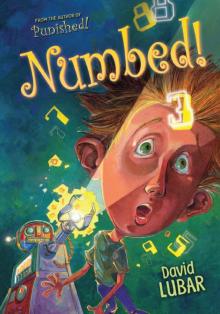 Numbed!
Numbed!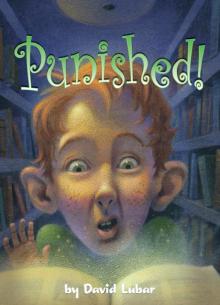 Punished!
Punished!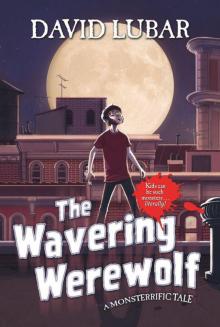 The Wavering Werewolf: A Monsterrific Tale (Monsterrific Tales)
The Wavering Werewolf: A Monsterrific Tale (Monsterrific Tales)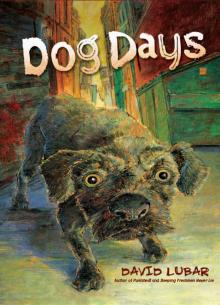 Dog Days
Dog Days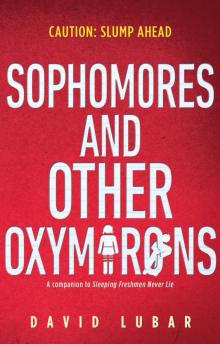 Sophomores and Other Oxymorons
Sophomores and Other Oxymorons The Psychozone
The Psychozone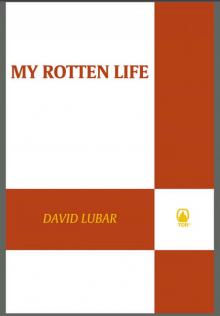 My Rotten Life
My Rotten Life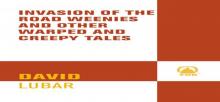 Invasion of the Road Weenies
Invasion of the Road Weenies In the Land of the Lawn Weenies
In the Land of the Lawn Weenies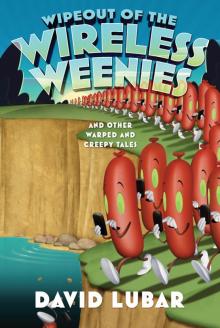 Wipeout of the Wireless Weenies
Wipeout of the Wireless Weenies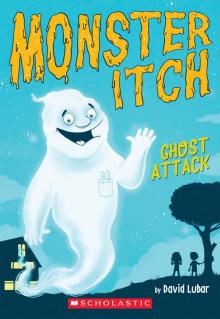 Ghost Attack
Ghost Attack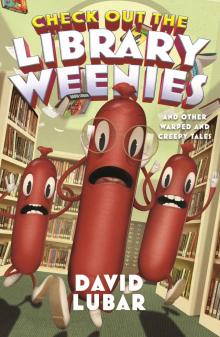 Check Out the Library Weenies
Check Out the Library Weenies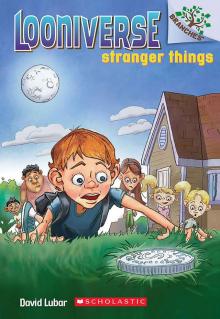 Looniverse #1: Stranger Things (A Branches Book)
Looniverse #1: Stranger Things (A Branches Book)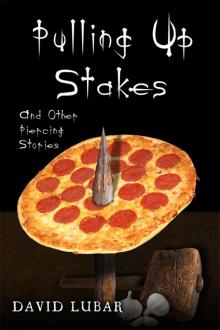 Pulling up Stakes and Other Piercing Stories
Pulling up Stakes and Other Piercing Stories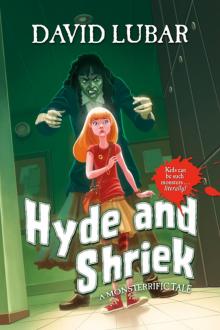 Hyde and Shriek
Hyde and Shriek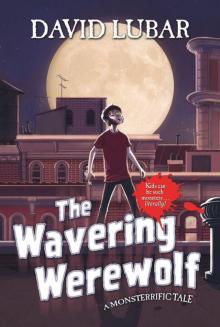 The Wavering Werewolf
The Wavering Werewolf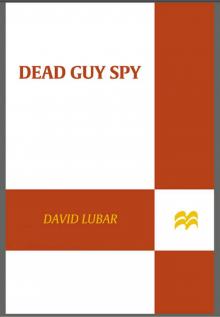 Dead Guy Spy
Dead Guy Spy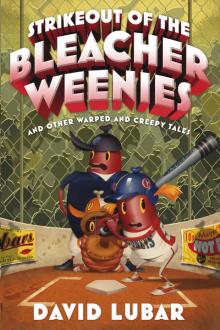 Strikeout of the Bleacher Weenies
Strikeout of the Bleacher Weenies The Big Stink
The Big Stink The Battle of the Red Hot Pepper Weenies
The Battle of the Red Hot Pepper Weenies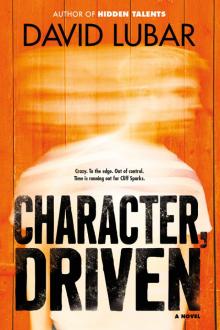 Character, Driven
Character, Driven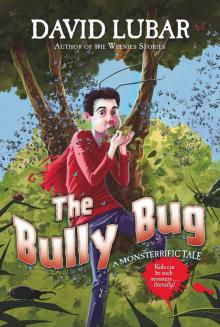 The Bully Bug
The Bully Bug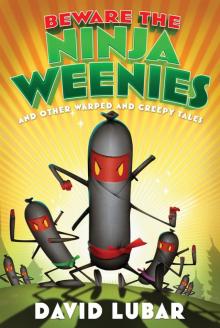 Beware the Ninja Weenies
Beware the Ninja Weenies Extremities: Stories of Death, Murder, and Revenge
Extremities: Stories of Death, Murder, and Revenge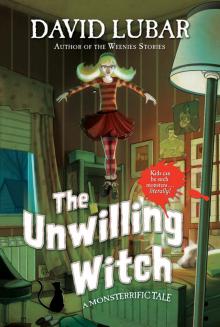 The Unwilling Witch
The Unwilling Witch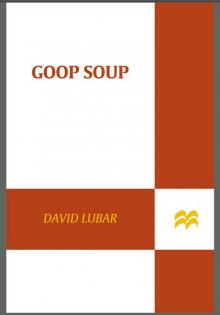 Goop Soup
Goop Soup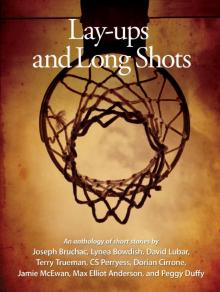 Lay-ups and Long Shots
Lay-ups and Long Shots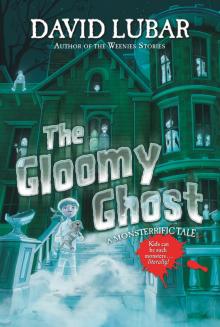 The Gloomy Ghost
The Gloomy Ghost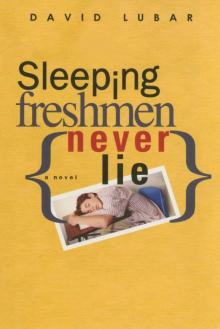 Sleeping Freshmen Never Lie
Sleeping Freshmen Never Lie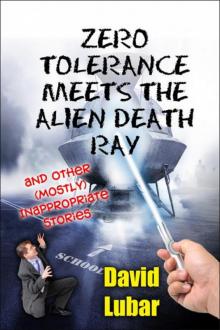 Zero Tolerance Meets the Alien Death Ray and Other (Mostly) Inappropriate Stories
Zero Tolerance Meets the Alien Death Ray and Other (Mostly) Inappropriate Stories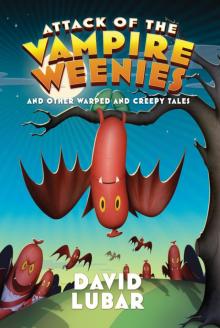 Attack of the Vampire Weenies
Attack of the Vampire Weenies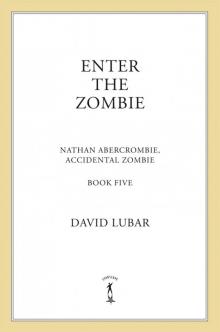 Enter the Zombie
Enter the Zombie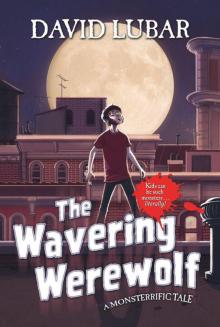 The Wavering Werewolf_A Monsterrific Tale
The Wavering Werewolf_A Monsterrific Tale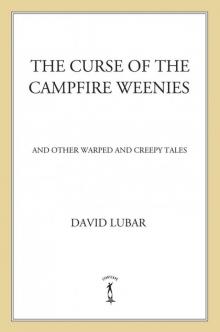 The Curse of the Campfire Weenies
The Curse of the Campfire Weenies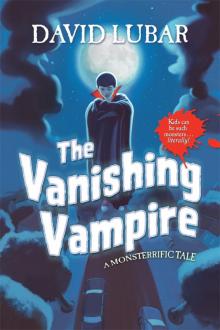 The Vanishing Vampire
The Vanishing Vampire